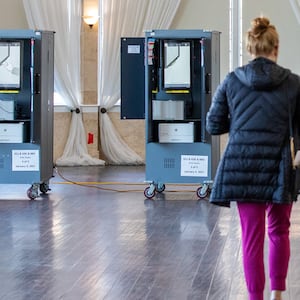DOUGLAS, GEORGIA—The Georgia Secretary of State claims it is investigating how a local election supervisor gave a cadre of 2020 election truthers improper access to an election computer system, in what initially seemed like the latest example of rogue actors misusing their government positions to cast doubt on President Joe Biden’s victory over Donald Trump.
But that investigation may expose a far more sinister plot than previously suspected.
According to text messages obtained by The Daily Beast, the covert access granted to Atlanta bail bondsman Scott Hall and his technical team was actually part of a coordinated effort to find election irregularities. And the effort, it turns out, was led by a local elections official and the chair of the rural county’s Republican Party—who was also one of former President Donald Trump’s infamous slate of fake electors.
Last month, The Washington Post revealed that the Secretary of State’s office was investigating the matter. But the previously unreported text messages shed new light on who arranged the possibly illegal access to the computer and who was on the team that traveled south to do it. The Secretary of State’s office is already fighting off a lawsuit over the security of the state’s voting machines and may face tough questions before a federal judge next week, given that the Coffee County incident demonstrates the state’s inability to keep its machines off limits.
The situation has election cybersecurity experts concerned about the actual danger to election systems posed by these vigilante expeditions, which are mainly driven by disproven conspiracy theories.
“Everything we have seen so far shows that the people who have been doing this have no fucking skills. You have an elephant in a porcelain store. They can accidentally install malware, accidentally cause all kinds of havoc,” said Harri Hursti, a Finnish computer programmer with extensive experience analyzing election systems.
The text messages acquired by The Daily Beast show two separate conversations in which former Coffee County GOP chair Cathy Latham and elections board member Eric Chaney lay out a plan to bring in a team of computer experts to access the computer voting system. The Daily Beast has verified that the conversations were real and remain stored on an iPhone.
In the weeks after the November 2020 election, people who refused to accept the results scrambled to find evidence of alleged vote tampering.
That included Misty Hampton, then the Coffee County elections supervisor, who made a viral video claiming to show how Dominion Voting System machines could flip votes. Her video fueled the quickly coalescing conspiracy theories and came at the perfect time—just as Trump advocate lawyer Sidney Powell and others launched so-called “Kraken” conspiracy lawsuits with bogus allegations of voting fraud.
While those bogus lawsuits clogged up the courts, ex-Overstock CEO Patrick Byrne and QAnon-friendly attorney Lin Wood funded independent efforts to send teams of “hackers and cybersleuths” to access voting computer systems across the country. It’s in that atmosphere that Coffee County became another front on the election denial battlefield.
At 4:26 p.m. on Jan. 6, 2021, as the Capitol building in Washington was under attack, another plan was in the works 607 miles away in the small town of Douglas, Georgia.
Chaney, the elections board member, received word that the county GOP chair was on the phone with an Atlanta businessman who wanted access to the voting system computers there.
“Scott Hall is on the phone with Cathy about wanting to come scan our ballots from the general election like we talked about the other day. I am going to call you in a few,” Hampton wrote to her boss in a text message conversation we obtained.
The next morning, the operation was underway. Text messages show that a group of five people traveled south from Atlanta to the government elections offices in Douglas. According to the texts, the team was led by Paul Maggio, an executive at a computer forensics and data storage company in the city.
Maggio and his firm, SullivanStrickler, played a role in perpetuating the myth of a Trump victory in 2020 as hired expert witnesses supporting a lawsuit against Antrim County, Michigan—another locality that was mired in bogus allegations of vote tampering—and the text messages show that the team headed to rural Georgia also included Jeffrey Lenberg, a man heralded by rightwing media as a “systems vulnerability expert” who also reviewed the voting machines in Antrim County.
Hall chartered a plane for a team set on copying a computer server that housed the elections management system, something that Hall, a member of that team, would later reveal on a call with an elections rights activist.
“Team left Atlanta at 8… 5 members led by Paul Maggio… Scott is flying in,” Latham texted on Jan. 7 at 9:46 a.m.
“I trust you all!” Latham wrote.
An hour later, a small single-propeller plane flying in from DeKalb-Peachtree Airport appeared on the horizon just north of the small city, according to flight records obtained by The Daily Beast. It landed at 11:06 a.m. at the Douglas Municipal Gene Chambers Airport. A short time later, Latham checked in on Hampton.
“Scott has landed and the rest of team is almost to Douglas,” Latham wrote.
Hall and the team made their way to the windowless Elections and Registration building. Hampton would later tell The Daily Beast that Chaney and Latham were there, and she recalled telling her junior assistant, Jil Riddlehoover, to stay quiet.
“I told her, ‘You sit over there. You don’t say anything. You don’t know what’s going on,’” Hampton recalled.
While others did technical work, Hampton went and bought pizza for the crew across the street, she told The Daily Beast. The operation continued for hours. At 3:48 p.m., Hampton updated the GOP chair.
“Going great so far,” she texted Latham.
The team’s work wrapped up later that afternoon. Flight records show that the propeller plane left the tiny airport at 5:16 p.m. When Hampton reached out to Chaney that evening, he directed her to take the communications to an encrypted app with disappearing messages.
“Let’s switch to Signal,” he wrote to her at 7:24 p.m.
In the following weeks—as Trump was impeached for his role in stoking the Capitol riots and the illegal accessing of voting machines came into focus—word got out about their secret mission in Douglas. The board of elections forced Hampton and her assistant to resign on Feb. 25, 2021. The official story was that they had faked their employee timesheets by claiming to be in the office when they weren’t (something Hampton readily admitted to The Daily Beast and justified as making up for accrued comp time).
But faking work appearances didn’t seem to bother Chaney. The very next day, he hired Riddlehoover to work at his used car dealership, Chaney Motors, Hampton and Latham both told The Daily Beast.
The local news website Douglas Now covered their resignations in early March. Now that Hall’s mission was unraveling in the public eye, he reached out to an election rights activist to recount his experience in Douglas. He found an audience with Marilyn Marks, whose voting rights group, Coalition for Good Governance, appeared to be a friendly audience. The group seeks to expose what it considers ongoing vulnerabilities in Georgia’s electronic-only voting system. Marks, stunned by what she began to hear, started recording the call.
“You know the same people that went up to Michigan, OK, and did all that forensic stuff on the computers… they sent their team down to Coffee County, Georgia. And they scanned all the equipment, imaged all the hard drives, and scanned every single ballot. You know, absentee, in person, and absentee by mail,” he told her.
“How in the world did you get permission to do that?” Marks asked him.
“We basically had the entire elections committee there. And they said, ‘We give you permission. Go for it.’ So, they went in there and imaged every hard drive of every piece of equipment. You know, all the poll pads, everything,” he responded.
Last week, on the eve of the state’s primary elections, The Daily Beast drove to the small city of Douglas to meet with several witnesses and gather government records that confirmed people’s employment and personal relationships.
Latham, reached at her home, sat down and spoke to The Daily Beast on her front porch for nearly an hour but professed ignorance about any details of the team’s visit.
“Did Trump send a team? Pfft. How could somebody sneak here? Do you know where the elections board is? It's in the middle of downtown. You could not have snuck anybody in here. I don’t know how they did that,” she said. “Honestly don't know who would know… all I know is what the paper said.”
Latham did, however, say she relayed doubts about Coffee County’s election system to Georgia Republican Party leadership on a Zoom call in the days after the November 2020 election, when the local board of elections refused to certify election results because it could not replicate the original results during a recount. (There was a 50-vote discrepancy, which would not be nearly enough to flip the state’s results.)
Latham surmised that her discussions may have reached national GOP leadership, which could explain why the Trump administration named Coffee County in a draft executive order dated Dec. 16, 2020, that would have authorized the nation’s defense secretary to “seize, collect, retain and analyze” election equipment.
Latham, a retired economics teacher, has since quit her role as local GOP chair and is currently preparing to sell her home and leave Georgia for Texas.
The Daily Beast paid a visit to another elections board member, Carl Travis Peavy Jr., who would have been briefed on the team’s visit. He declined to be interviewed.
Neither Chaney nor Riddlehoover returned calls since The Daily Beast reached out to them last week.
Maggio, who allegedly led the team, declined to discuss his trip to Coffee County.
“I appreciate you calling, but I’m not going to talk about that,” he told The Daily Beast by phone on Thursday evening.
Whatever Hall’s team found, it didn’t amount to much. As Hall would recall on his call with Marks, “I went down there. We scanned every freaking ballot and the elections director and her assistant lost their job, and have yet learned zero about all of that effort… we haven’t had a report from anybody.”
A two-minute and thirty-six-second snippet of that call was presented to a federal judge in a case led by Marks’ voting rights group. The case alleges that Georgia’s voting system is insecure—and could present a threat to future elections. New details about this incident in Coffee County have only recently presented new issues in that lawsuit, which seeks to replace the state’s touchscreen-only tablet ballot marking devices.
In that ongoing lawsuit, Secretary of State Brad Raffensperger’s office has maintained it is investigating the alleged unauthorized access in Coffee County. Last summer, the secretary of state’s office seized and replaced the computer server in question. However, that has only generated even more questions about what it’s doing to assess the potential threat to a popular election software used across the country.
“The Secretary of State’s and Coffee County’s claims that they knew nothing about this alleged unauthorized access will not withstand scrutiny,” Marks told The Daily Beast. “Strangely, the ‘investigation’ did not create a single document or email. Even more coincidentally, Coffee County has deleted all emails of their election officials from that period, and improperly gave Secretary Raffensperger’s office all of their 2020 electronic election records, wiping the county clean of evidence of what occurred. These excuses cannot pass muster in the eyes of voters.”
Concerns about unauthorized access to these machines could receive a jolt, given the latest assessment by the Department of Homeland Security’s Cybersecurity and Infrastructure Security Agency.
CISA, as it’s called, just authored a yet-unreleased “advisory” reviewed by The Daily Beast that “identifies vulnerabilities affecting versions of the Dominion Voting Systems Democracy Suite ImageCast X,” a popular software used on voting machines in Georgia and elsewhere. The report supports past warnings about the software made by University of Michigan cybersecurity researcher J. Alex Halderman, who first spotted those weaknesses in a report that remains sealed by the federal judge.
The CISA advisory notes that “exploitation of these vulnerabilities would require physical access” to devices and election management servers, and warns that “jurisdictions can prevent and/or detect the exploitation of these vulnerabilities” by creating rules that “that limit unauthorized access or manipulation of voting systems.”
The vigilante team’s visit to Coffee County flies in the face of that, hence the growing pressure for Raffensperger to explain what his office has found in its investigation.
However, in a court filing on Wednesday, lawyers for the office informed U.S. District Judge Amy Totenberg that the only paperwork reflecting the investigation and its seizure of the potentially exposed machine is a cryptic technical document that shows how a new machine was brought online there on June 8, 2021. Those lawyers hedged that the search for documents was “conducted during a trial and during ongoing elections.” The state agency is expected to face questions about this during a court hearing next week.
David Cross, an attorney representing a group of voting rights activists in that lawsuit, said this matter isn’t getting the level of scrutiny it deserves.
“You don’t swap out a county election management system—particularly where there's a claim someone had unauthorized access to this—without any documentation,” he told The Daily Beast. “If someone got access to it, then their whole defense is eviscerated.”
Last week, Hampton told The Daily Beast that she still has not received a phone call from investigators—casting more doubt on the veracity of the state’s effort to actually get to the bottom of what happened.
The concern now, cybersecurity experts said, is that conspiracy-driven vigilantes now have unfettered access to a copy of Georgia’s voting software. Similar attempts in Colorado, Michigan, and Ohio have been investigated. One, in Mesa County, Colorado, has already led to an indictment.
The obvious worry is that these teams might find vulnerabilities and share them with hackers who can actually exploit them. But what’s really driving anxiety is that their sloppy computer work will itself plant evidence of tampering that fuels the Big Lie.
“Because these idiots are being idiots, when they do these copies they leave—as they did in Mesa County—evidence that this computer has been tampered with,” said Hursti, the Finnish computer programmer. “So now there is a claim this server was tampered with when it was actually the Stop the Steal people!”











